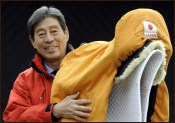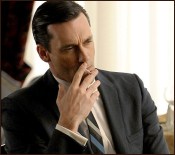A Season of “Mad Men”
 I wish I had something profound, brilliant and original to say about the London Olympics. However, a quick examination of the morning papers suggests that all the best superlatives and metaphors have been used, nearly every last sporting cliché has been deployed, and even fake sideburns, à la Bradley Wiggins, have become an essential fashion accessory. Sometimes, events are beyond further analysis or comment. The cynic occasionally finds the sharpened tongue dulled by enthusiasm, the sceptic has their dun-coloured outlook brightened by a spectacle like an Opening Ceremony that celebrates the National Health Service, the curmudgeon’s grumbles are stilled by marvels like the 71 year old Japanese athlete Hiroshi Hoketsu taking part in Olympic Equestrian events.
I wish I had something profound, brilliant and original to say about the London Olympics. However, a quick examination of the morning papers suggests that all the best superlatives and metaphors have been used, nearly every last sporting cliché has been deployed, and even fake sideburns, à la Bradley Wiggins, have become an essential fashion accessory. Sometimes, events are beyond further analysis or comment. The cynic occasionally finds the sharpened tongue dulled by enthusiasm, the sceptic has their dun-coloured outlook brightened by a spectacle like an Opening Ceremony that celebrates the National Health Service, the curmudgeon’s grumbles are stilled by marvels like the 71 year old Japanese athlete Hiroshi Hoketsu taking part in Olympic Equestrian events.
Apart from the Olympics, there is presently a dearth of entertaining television. It’s August: much of Europe is closed for business. In my mind’s eye, I can visualise the entire population of Paris climbing into Citroen 2CVs and aged Peugeots with luggage strapped to the roof, then driving off to the sunshine and beaches of the Riviera. Less romantically, children on both sides of the Atlantic are on their summer holidays. If I ransack my memory for memorable Augusts, I find a noticeable lack: usually, it’s the waiting room of the year, a pause before final blast off in September. The biggest annoyances are generally flies and sudden downpours at picnics; these are soothed with another icy glass of Pimms. Given that it’s such a low octane month, it’s no wonder that the programme planners at the BBC and ITV reach for their dustiest shelves when pulling down recordings of yesteryear’s shows. For example, I think BBC Three is making a point of showing the same aged episodes of “Family Guy” at least three times per week, just to ensure that no one missed them. Or perhaps they thought that people in an August frame of mind wouldn’t notice.
In order to provide a break from sport, tedium and the prevailing overcast weather, my other half bought the DVDs of the first season of “Mad Men”. As with the Olympics, most of the florid language which could be used to describe it has already been deployed. “Stylish”, “brilliant”, “masterfully written” and “beautifully filmed” are all terms which have appeared repeatedly in reference to this show. Previously, I’d been put off by the hype: besides, I had a bad feeling that a period piece about America in the 1960’s would be somehow self indulgent. The United States was dominant during this period and it was reasonable to fear that the show’s American producers would be unable to resist the temptation to paint the time in far too warm colours. Additionally, it was difficult to envisage how a programme that featured the sultry and alluring Christina Hendricks as Joan Holloway (a character which is suggested could be Marilyn Monroe’s role model) could be anything other than an encomium to the era.
[AMAZONPRODUCT=B0014XVTIY]
However, it isn’t. The Sixties are presented as a seething, jittery time from the moment we’re shown the opening credits: the theme music suggests jangled nerves and depression, an animation shows a man stepping into his office and then falling through the floor. The characters are a peculiar yet realistic mix of virtue and vice. Don Draper (Jon Hamm), the main character, is an advertising executive. He is simultaneously a serial womaniser and a caring father; he is moral vacuum yet also an ethical businessman. The latter quality is illustrated when Draper’s firm is presented with a choice: they could either continue to work with a small, regional airline called Mohawk, or they could drop them in order to have a chance at earning American Airlines’ custom. Draper strongly argues in favour of Mohawk on the basis of principle. He states that it would simply be wrong to drop a customer that had been honest, straightforward and enthusiastic: this objection is ignored. Draper’s agency subsequently fails to land the client due to a change in American Airlines’ management. Whether the writers intended it or not, this episode encapsulated the thinking which eventually led to our current economic problems; ignore the solid if unspectacular, gamble on big gains. Furthermore, senior management do not appear to pay a particular price for this failure and thus are free to fail again due to indulgence in mindless greed.
The programme also puts the mutability and low cunning of capitalism on display. Draper is presented with a leaflet by a younger colleague; it’s written by the avowedly socialist “Students for a Democratic Society”. However, the commercially-minded Draper and his associate are not at all alarmed by the prospect of hordes of young Reds taking over the country, rather, they look at the tract’s implied messages in order to better sell a brand of coffee to the youth market. Lenin once stated that the capitalists would sell him the rope with which he would hang them; Draper proves to be the anti-Lenin, by twisting the words and thoughts of socialists into a lasso which will rope them into buying more of his clients’ wares.
 “Mad Men” also makes a statement about America as a whole: essentially, it suggests that it’s a land littered with psychologically questionable yet likeable phonies. Draper is a “self-made” man: his identity is based on fabrication. He possesses intelligence, cunning, but most of all, ambition; behind the winning smile and confident demeanour is a deeply insecure individual who cannot find respite from his desire for more. He does have “better angels”; sometimes they win, probably not often enough. He is furthermore often a slave to passion. Yet the viewer can’t hate him: for example, a visit he makes to his distressed colleague Peggy (who is languishing in hospital) prevents overt dislike of his character. One can’t truly warm to him either: he’s too unreliable. A comedian who has been cuckolded by Draper tells the dapper ad man that he’s “garbage” and “he knows it”; Draper doesn’t argue. Later, however, Draper punches the comedian in the face. It may be that many struggle with emotions about Draper’s country that are just as conflicted as their feelings about him. Many are likely charmed by the idea of a land of opportunity; they dislike what it takes to reach the upper echelons of American society. There is a belief that Americans are forthright; but perhaps “Mad Men” illustrates that this quality is a veneer, an overt falsehood which is all too detectable. It is a country in which many, like Peggy’s family, are imbued with a strong religious faith; it is also a place where casual adultery happens on a regular basis. It’s a nation that prides itself on being free, but “Mad Men” is full of characters like the closeted homosexual Sal Romano and the fad-chasing Paul Kinsey who seem anything but liberated. The Declaration of Independence states the “pursuit of happiness” is an inalienable right, but one of the show’s more memorable quotes is, “Everything you think’s gonna make you happy, just turns to crap.” It is fair to say that every society contains a coalition of opposites and the opportunity to say “on the other hand”: perhaps these contradictions pull at each other with greater vigour in the United States than elsewhere. This may be the subtle cause of the writhing restlessness that lurks behind the sharply tailored suits, the regularity of three drinks at six o’clock, and the brightly polished Cadillacs. The Sixties are shown to be good times, yet much is terribly wrong.
“Mad Men” also makes a statement about America as a whole: essentially, it suggests that it’s a land littered with psychologically questionable yet likeable phonies. Draper is a “self-made” man: his identity is based on fabrication. He possesses intelligence, cunning, but most of all, ambition; behind the winning smile and confident demeanour is a deeply insecure individual who cannot find respite from his desire for more. He does have “better angels”; sometimes they win, probably not often enough. He is furthermore often a slave to passion. Yet the viewer can’t hate him: for example, a visit he makes to his distressed colleague Peggy (who is languishing in hospital) prevents overt dislike of his character. One can’t truly warm to him either: he’s too unreliable. A comedian who has been cuckolded by Draper tells the dapper ad man that he’s “garbage” and “he knows it”; Draper doesn’t argue. Later, however, Draper punches the comedian in the face. It may be that many struggle with emotions about Draper’s country that are just as conflicted as their feelings about him. Many are likely charmed by the idea of a land of opportunity; they dislike what it takes to reach the upper echelons of American society. There is a belief that Americans are forthright; but perhaps “Mad Men” illustrates that this quality is a veneer, an overt falsehood which is all too detectable. It is a country in which many, like Peggy’s family, are imbued with a strong religious faith; it is also a place where casual adultery happens on a regular basis. It’s a nation that prides itself on being free, but “Mad Men” is full of characters like the closeted homosexual Sal Romano and the fad-chasing Paul Kinsey who seem anything but liberated. The Declaration of Independence states the “pursuit of happiness” is an inalienable right, but one of the show’s more memorable quotes is, “Everything you think’s gonna make you happy, just turns to crap.” It is fair to say that every society contains a coalition of opposites and the opportunity to say “on the other hand”: perhaps these contradictions pull at each other with greater vigour in the United States than elsewhere. This may be the subtle cause of the writhing restlessness that lurks behind the sharply tailored suits, the regularity of three drinks at six o’clock, and the brightly polished Cadillacs. The Sixties are shown to be good times, yet much is terribly wrong.
So far as I know, “Mad Men” isn’t being broadcast on British television at the moment; it’s easy to see why it would be out of kilter now given the bonhomie imbued by August and the Olympics. Programme planners would rather endlessly repeat jokes about flatulent cartoon characters for those not focused on the spectacle and wonder we see in London. New episodes of “Mad Men” are generally shown between March and June. A pity: it’s more of a September show, with its bright days and ever darkening nights; now is a time to linger in the sun, if one can find it, dip one’s toes into bright Mediterranean seas, and allow Bradley Wiggins style sideburns, if apropos, to grow. In September, there will be a lot more to think about.


